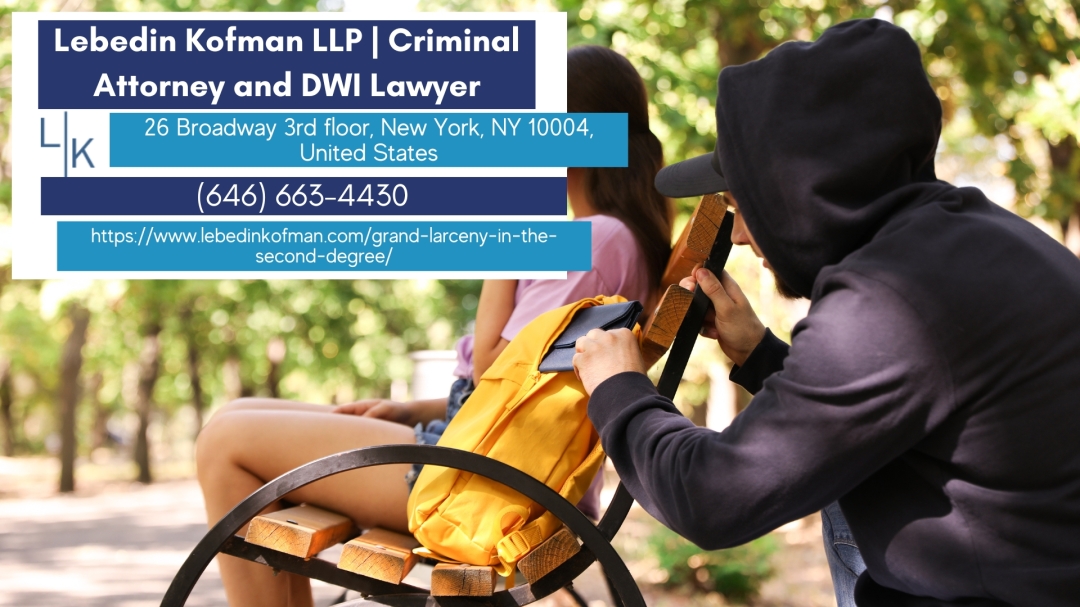Russ Kofman, a criminal defense attorney at Lebedin Kofman LLP, offers crucial insights on a New York grand larceny 2nd degree charge. Grand larceny in the second degree is one of New York’s most serious theft-related offenses, involving significant financial thresholds and potential long-term consequences. Kofman highlights key aspects of the charge and the legal strategies available to those accused of this crime in New York.
A New York grand larceny 2nd degree charge applies when a person is accused of stealing property valued at $50,000 or more. Kofman outlines that the stakes are high, as a conviction for this class C felony can result in prison time of up to 15 years. For individuals facing such charges, it is essential to understand not only the legal definition of grand larceny in the second degree but also the potential defenses that can be raised. According to Kofman, several factors can impact the outcome of these cases, including the nature of the evidence, the intent of the accused, and any mitigating circumstances.
In New York, a grand larceny 2nd degree charge may arise in cases involving embezzlement, theft from an employer, or large-scale fraud schemes. Russ Kofman explains that such charges typically involve complex financial transactions, which makes it critical for those accused to fully understand the legal process and explore available defenses. “A New York grand larceny 2nd degree charge can be intimidating due to the large amounts of money involved,” Kofman says. “However, there are legal defenses that can be pursued, depending on the unique circumstances of each case.”
Kofman emphasizes that one of the most critical components of defending against a New York grand larceny 2nd degree charge is challenging the prosecution’s ability to prove intent. The prosecution must demonstrate that the accused had a clear intention to permanently deprive the rightful owner of their property. If there is doubt about the defendant’s intent, it can weaken the case against them. Additionally, Kofman notes that there may be opportunities to reduce charges or negotiate plea deals, particularly in cases where there is no prior criminal history.
New York law defines grand larceny in the second degree under Penal Law § 155.40, which classifies it as a non-violent felony. Despite the non-violent classification, Kofman points out that the financial impact of these crimes often leads to aggressive prosecution. As a result, individuals accused of this crime should be aware of the severe penalties they may face if convicted. These penalties can include substantial fines, restitution payments, and a permanent criminal record, in addition to prison time.
Russ Kofman also discusses how certain defenses can be used to counter a New York grand larceny 2nd degree charge. For example, if the defendant can prove they had a legal claim to the property or that they lacked the intent to steal, it may result in a favorable outcome. Kofman also highlights the importance of reviewing the circumstances under which the alleged crime took place. Any procedural errors, such as violations of the defendant’s rights during the investigation or arrest, can also be used to challenge the prosecution’s case.
In cases involving large sums of money, Kofman explains that the prosecution will often rely heavily on documentary evidence, such as bank statements, contracts, or digital records. He advises that it is crucial for the defense to thoroughly review this evidence and look for inconsistencies or errors that could cast doubt on the prosecution’s claims. “Thorough preparation and understanding of the evidence are key components of building a strong defense,” Kofman says.
The legal system in New York treats grand larceny offenses very seriously, especially at the second-degree level. Kofman stresses that individuals facing such charges should act quickly to understand their legal options and avoid making mistakes that could harm their case. Early intervention can sometimes lead to more favorable outcomes, such as reduced charges or even case dismissals. Working with an attorney experienced in handling financial crimes can make a significant difference in navigating these cases.
Individuals accused of a New York grand larceny 2nd degree charge must be prepared for a legal battle that could have long-lasting effects on their personal and professional lives. These charges often carry a significant stigma and can affect employment opportunities, financial stability, and social standing. Kofman highlights that each case is unique, and the legal strategy must be tailored to the specific facts and evidence presented.
About Lebedin Kofman LLP:
Lebedin Kofman LLP is a New York-based law firm known for its work in criminal defense, including defending clients against theft-related offenses such as grand larceny. The firm handles a wide range of criminal cases, providing legal representation to clients facing serious charges in New York. Attorney Russ Kofman has extensive experience in handling criminal matters and is committed to defending the rights of those accused of crimes.
Embeds:
Youtube Video: https://www.youtube.com/watch?v=f5au6dm_vSY
GMB: https://www.google.com/maps?cid=8774315708012683965
Email and website
Email: info@lebedinkofman.com
Website: https://www.lebedinkofman.com/
Media Contact
Company Name: Lebedin Kofman LLP
Contact Person: Russ Kofman
Email: Send Email
Phone: (646) 663-4430
Address:26 Broadway 3rd floor
City: New York
State: New York 10004
Country: United States
Website: https://www.lebedinkofman.com/

